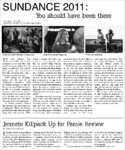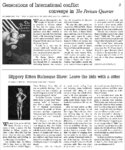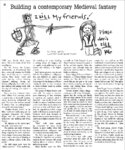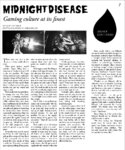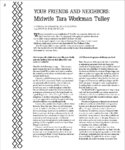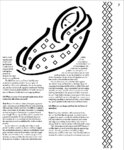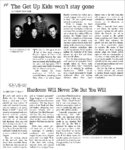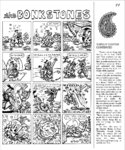| OCR Text |
Show OPINIONS A6 This land is our land Upcoming conference about immigration: "Borders: Global and Local Problems and Possibilities" Annual J. Bonner Ritchie Dialogue on Peace and Justice Papers presented by Dr. James Bohman, Charles Bowden, Dr. Olivia Ruiz, Mark Lopez and Gene England and Geoffrey Cockerham March 29-31 LI 120 ilk Alit _ Maomi Blackburn/UVU Review Overlooking federal jurisdiction, the U.S. Constitution, and basic human rights, the Arizona copycat immigration bill has brought a lot of controversy to Capital Hill, bringing UVU students to its steps in protest. By Celeste Tholen Rosenlof Opinions Editor A melting pot of backgrounds and people. The land of the free and home of the brave. A land of opportunity. Most people call it America, and some people actually want to move here. A word of caution though; if you move to Utah after a proposed immigration bill passes, you better have your papers, or you will be gone if there is a single reasonable suspicion you're not from around here. On Monday, Jan. 24, UVU students and the United for Social Justice organization held a rally on the capital against representative Sandstrom's modified version of the Arizona SB 1070 bill. The bill focuses on sending undocumented immigrants back to where they came from and takes over what should be the job of the federal government. "Immigration authority is fundamentally federal," Mark Alvarez, an immigration law attorney, said in an email interview. "It is based on powers in the U.S. Constitution as interpreted by the U.S. Supreme court. ... State action mostly would be costly, misguided and disrupted. Except within a limited scope, state action on immigration is unconstitutional." The American Immigration Council website said, "The Arizona law goes well beyond federal law, copying the words of certain immigration statutes but imposing new and often more severe pen- alties than the federal law. This creates difficult and complex jurisdictional issues, as the federal government has been given the exclusive power to regulate immigration law, especially civil immigration law." In addition to being legally problematic, the bill, if it becomes law, will also be expensive for the state to initiate and maintain by placing added responsibility on state police to regulate what should be a federally regulated system. For example, in a fact sheet put together by Arizona Sheriff Ralph Ogden, the annual cost to Yuma County law enforcement agencies would be between $775,880 and $1,163,820.00 for processing expenses, between $21,195,600 and $96,086,720 for jail costs, around $810,067 to $1,620,134 in attorney and staff fees and also an unknown expense to build additional detention facilities for detention of undocumented immigrants. The cost for this bill in Utah could be projected to be similar, and when the state is allocating resources elsewhere, other statefunded programs and projects experience budget cuts. "Anytime [Utah] has to cut funding to fund bills like this, you have to realize that with UVU being a state-funded school, it cuts our funding," said Chris Manor, rally organizer with the RSU (Revolutionary Students Union) and UVU student. While many can agree that something needs to be done about illegal immigration, changes must also occur in the process of legal immigration and the accessibility of it to more people. Our current system is inexcusably outdated and unfair. "Visa quotas have to be adjusted to economic and societal realities," said Alvarez. "Immigration processes have to be streamlined and waiting lists made reasonable. ... Work-based visas should be equitable for workers at various skill levels whose services are in need in the U.S. economy. Borders should not be open or closed; borders should be smart." Because of the current system, those who have come here illegally live in the shadows, fearing that they will be caught and deported instead of celebrating the freedom which they sought for when they made their journey across the border. Immigrants, if illegal, are not seen as humans with any redeeming qualities or contributions. "I am tired of the undocumented population being treated as suspicious, especially after all the contributions they have made through hard work in precarious circumstances," said Alvarez. "As an attorney, I accept that an undocumented person is breaking the law, but I also found many of the undocumented to be exemplary human beings." The land of milk and honey needs these immigrants integrated into its societies rather than excluding and driving them further into the niche of isolation. This bill is unconstitutional, extreme and harsh, and only worsens the problem of undocumented citizens living within our borders. Gilbert Cisneros/UVU Review 1 Ul ' Maomi Blackburn/UVU Review Gilbert Cisneros/UVU Review |



















